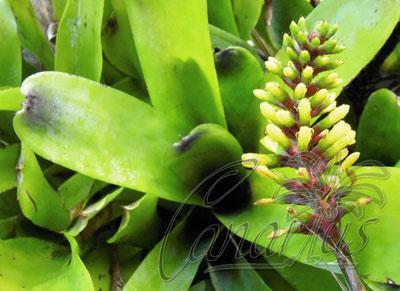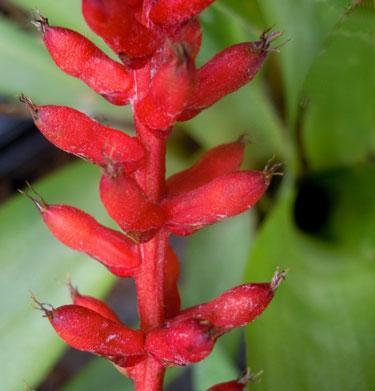 Beautiful Aechmea from the outskirts of a city named Blumenau, in the cool, wet South East of Brazil. Aechmea blumenavii is a rare, cold hardy bromeliad. It is endemic to Sierra de Santa Catarina, by the city of Blumenau in SE Brazil.
Beautiful Aechmea from the outskirts of a city named Blumenau, in the cool, wet South East of Brazil. Aechmea blumenavii is a rare, cold hardy bromeliad. It is endemic to Sierra de Santa Catarina, by the city of Blumenau in SE Brazil.
Aechmea blumenavii is an endangered species and it is classified as Rare by the IUCN. This is the TRUE blumenavii, not the many mislabelled specimens in the trade. That’s why it is a rare endangered species in habitat. It is a tropical looking species which is highly sought after for gardening in non tropical countries because it is able to stand freezes to about -8 C.
 Aechmea blumenavii in the Garden
Aechmea blumenavii in the Garden

Aechmea blumenavii is very easy to grow in cultivation. Leaves are green and show the typical blue tip. Spikes of yellow flowers are produced in the cooler months, followed by pink-red fruits. Fruits will stay colourful for months.
As time passes it grows as a mat-forming ground cover. As a bromeliad, it will need a draining substrate, with sand, compost or similar. It will enjoy growing on a raised bed or a rockery. It can also be grown on trees or rocks.
It grows as a house plant because it takes shade and dry air, so growers can take it indoors in the winter months to enjoy the flowers.
Frost-hardy Aechmea with blue-tipped green leaves, from the outskirts of a city named Blumenau
Click To Tweet
Our Shop
Please visit the Bromeliad Section of our Shop and check back often, because we offerent different bromeliads at different times of the year. We ship bromeliads to anywhere in Europe. Our bromeliads are already growing in many European countries, such as Spain, Ireland, Italy, Poland, and Germany.
All bromeliads in catalog are sold as bare-rooted “pups”, which are the robust basal suckers produced after blooming. Our pups are very easy to root – some will already show some roots when you open the box.

